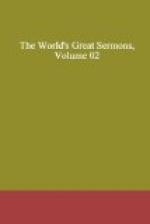“Now the God of peace, who brought again from the dead our Lord Jesus Christ, the great Shepherd of the sheep, through the blood of the everlasting covenant, make us perfect in every good work to do his will, working in us always that which is pleasing in his sight, through Jesus Christ, to whom be glory forever. Amen.”
HOWE
THE REDEEMER’S TEARS OVER LOST SOULS
BIOGRAPHICAL NOTE
John Howe, a leading writer and divine under the Commonwealth, was born in 1630, at Loughborough, in Leicestershire, England. He was educated at Cambridge and Oxford, and ordained by Charles Herle, rector of Winwick, whom he styled, “a primitive bishop.” He became chaplain to Cromwell and his son Richard. Among his contributions to Puritan theology are “The Good Man the Living Temple of God,” and “Vanity of Men as Mortal,” He was a man of intellect and imagination. His sermons, tho often long and cumbersome, are marked by warmth of fancy and a sublimity of spirit superior to his style. Howe was a leading spirit in the effort made for the union of the Congregational and Presbyterian bodies. He died in 1705.
HOWE
1630-1705
THE REDEEMER’S TEARS OVER LOST SOULS
And when He was come near, He beheld the city, and wept over it, saying, If thou hadst known, even thou, at least in this thy day, the things which belong to thy peace! But now they are hid from thine eyes.—Luke six., 41, 42.
Such as live tinder the gospel have a day, or a present opportunity, for the obtaining the knowledge of those things immediately belonging to their peace, and of whatsoever is besides necessary thereunto. I say nothing what opportunities they have who never lived under the gospel, who yet no doubt might generally know more than they do, and know better what they do know. It suffices who enjoy the gospel to understand our own advantages thereby. Nor, as to those who do enjoy it, is every one’s day of equal clearness. How few, in comparison, have ever seen such a day as Jerusalem at this time did I made by the immediate beams of the Sun of Righteousness! our Lord Himself vouchsafing to be their Instructor, so speaking as never man did, and with such authority as far outdid their other teachers, and astonished the hearers. In what transports did He use to leave those that heard Him, wheresoever He came, wondering at the gracious words that came out of His mouth! And with what mighty and beneficial works was He went to recommend His doctrine, shining in the glorious power and savoring of the abundant mercy of Heaven, so that every apprehensive mind might see the Deity was incarnate. God was come down to entreat with men, and allure them into the knowledge and love of Himself. The Word was made flesh. What unprejudiced mind might not perceive it to be so? He was there manifested and vailed at once; both expressions are made concerning the same matter. The divine beams were somewhat obscured, but did yet ray through that vail; so that His glory was beheld of the only-begotten Son of His Father, full of grace and truth.




